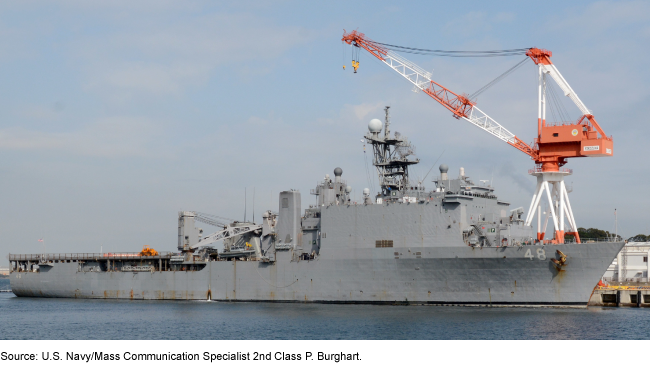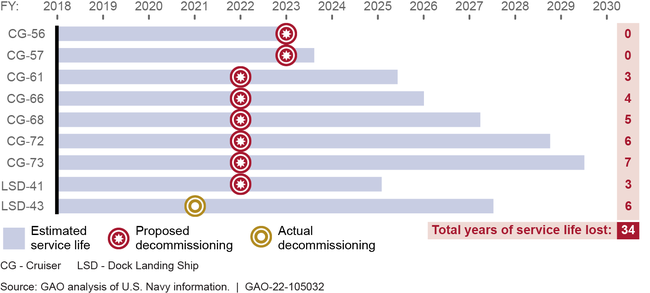Navy Ships: Applying Leading Practices and Transparent Reporting Could Help Reduce Risks Posed by Nearly $1.8 Billion Maintenance Backlog
Fast Facts
Navy ships need regular, intensive maintenance. But the Navy reported a $1.7 billion backlog of deferred maintenance on just its surface ships. Of that, $1.2 billion is for ships the Navy proposed decommissioning early—in part because of their maintenance costs.
Navy reports don't show the full extent, causes, or risks of deferred maintenance. Reducing the backlog could help fleets last longer and improve Navy operations.
Leading practices for managing maintenance backlogs could help the Navy get on track. For example, one practice is setting performance goals for backlog reduction. We recommended aligning Navy efforts with these practices.
The USS Ashland, an amphibious dock landing ship, in Yokosuka, Japan

Highlights
What GAO Found
In the past decade, surface ships have accounted for nearly all of the Navy's deferred depot maintenance backlog. Aircraft carriers have experienced minimal increases in backlog, and maintenance is rarely deferred for submarines. At GAO's request, the Navy developed an estimate of its maintenance backlog that totaled nearly $1.8 billion, comprising nearly $1.7 billion for surface ships and nearly $100 million for carriers. The surface ship maintenance backlog included $1.2 billion for deferred maintenance on ships the Navy proposed to decommission early in its fiscal year 2022 budget request. The accumulated maintenance backlog contributed to the Navy decisions to decommission nine ships, according to officials, which will result in the loss of 34 years of ship service life (see figure). Early decommissioning leads to a smaller fleet and could hinder efforts to meet operational and presence requirements.
Proposed or Actual Decommissioning of Ships with Deferred Maintenance Backlog

Managing the surface fleet's depot maintenance backlog, the Navy met six of the nine leading practices that GAO has previously identified as effective strategies for managing deferred maintenance backlogs. Specifically, it has not established comprehensive performance measures for reducing the backlog; identified the full range of risks posed by a lack of timely investment; or identified the funding needed to address the backlog of deferred depot maintenance. Doing so would help the Navy better manage its surface fleet.
The Navy understated the amount of its ship deferred depot maintenance in its 2021 financial reports by about $1.6 billion. The Navy reported only about $181 million in unfunded ship deferred maintenance in its 2021 annual financial report even though estimates it prepared for GAO show a nearly $1.8 billion backlog. The Navy has not established clear guidance for required information on ship deferred maintenance in financial reports. Having quality information on the costs of deferred maintenance—and the effects on maintenance backlogs—would provide the Navy and Congress with greater transparency about the Navy's efforts to maintain ships and would promote improved operational readiness.
Why GAO Did This Study
To keep its fleet of surface ships, aircraft carriers, and submarines ready, the Navy requires ships to undergo regular, intensive depot-level maintenance. Yet at times the Navy has deferred required depot-level maintenance due to operational demands or limited shipyard capacity and funding. This has created a backlog of deferred maintenance. Navy leaders stated maintaining the ships it currently has is a cost-effective way to help achieve its goal of growing the fleet.
House Report 116-442 included a provision that GAO review Navy deferred depot maintenance. GAO examines the Navy's (1) extent of deferred depot maintenance on surface ships, aircraft carriers, and submarines; (2) use of leading practices in managing deferred maintenance; and (3) reporting on the costs of deferred maintenance.
GAO examined deferred depot-level maintenance for surface ships, aircraft carriers, and submarines, and the associated backlog; reviewed Navy data and documents, including financial documents; and interviewed Navy officials. GAO evaluated Navy practices against leading practices GAO had identified for managing public-sector deferred maintenance backlogs.
Recommendations
GAO is making nine recommendations to incorporate leading practices for managing deferred maintenance and to improve Navy reporting on the depot maintenance backlog. DOD generally concurred with the recommendations.
Recommendations for Executive Action
| Agency Affected | Recommendation | Status |
|---|---|---|
| Department of the Navy | The Secretary of the Navy should ensure that Naval Sea Systems Command (NAVSEA) establishes performance goals, baselines for outcomes, and performance measures to manage the surface ship deferred depot maintenance backlog. (Recommendation 1) |
In 2022, as a result of GAO's review, the Navy developed a process for estimating the surface ship deferred depot maintenance backlog, and Navy officials sent GAO its estimate of its ship deferred maintenance backlog which we included in our report. In July 2024, citing our report, Naval Sea Systems Command issued a Basis for Measurement policy which established performance goals, performance measures, and baselines for outcomes to manage the ship deferred maintenance backlog. The policy directs that Navy will publish its performance against these metrics on an annual basis and brief senior leaders. By taking action to implement our recommendation, the Navy is better positioned to address the aggregate ship deferred maintenance backlog and restore more ships to full readiness status.
|
| Department of the Navy | The Secretary of the Navy should ensure that the Office of the Chief of Naval Operations identifies and assesses the full range of fleet-wide risks, including operational, technical, and economic risks, associated with deferred surface ship depot maintenance, and includes the assessment in an annual report to the Chief of Naval Operations published by NAVSEA. (Recommendation 2) |
In January 2025, the Navy issued an updated policy that outlines a standard process to identify and assess the full range of risks associated with deferred surface ship depot maintenance, including operational risk and economic risk. OPNAVINST 3120.47A includes a requirement for a risk assessment of fleet-wide industrial, economic and operational risks associated with the fleet's aggregate maintenance backlog. The policy directs that the fleet-wide risk assessment is required to be included in an annual letter submitted to the Office of the Chief of Naval Operations by U.S. Fleet Forces Command (USFLTFORCOM) Director, Fleet Maintenance (N43) and the U.S. Pacific Fleet (COMPACFLT) Director, Fleet Maintenance (N43). By taking action to implement our recommendation, the Navy is better positioned to address the aggregate ship deferred maintenance backlog and restore more ships to full readiness status.
|
| Department of the Navy | The Secretary of the Navy should ensure that NAVSEA publish in an annual report to the Chief of Naval Operations the current aggregate backlog estimate and an estimate of the maintenance required to be programmed and executed for each ship with canceled depot maintenance periods. (Recommendation 3) |
The Department of Defense concurred with this recommendation. In August 2022 the Navy, citing our report, issued a report on the total depot-level maintenance backlog for surface ships. On March 15, 2023 the Navy published a new policy document, citing our report, that established a standard process to annually estimate the aggregate surface ship depot maintenance backlog. The policy document, Surface Maintenance Engineering Planning Program Instruction 4700.01, states that the process also applies to maintenance that has been deferred due to the cancellation of ship depot maintenance periods. The policy will be in effect for 10 years.
|
| Department of the Navy | The Secretary of the Navy should ensure that the Office of the Chief of Naval Operations modifies its maintenance requirement process to require that SURFMEPP continue estimating depot-level maintenance requirements until the Congress has accepted Navy decommissioning proposals. (Recommendation 4) |
The Department of Defense concurred with this recommendation. In 2022, in response to our review, SURFMEPP started tracking all surface ship maintenance requirements for ships on the current proposed decommission list. On March 15, 2023 the Navy published a policy document, citing our report, that established a standard process to annually estimate the aggregate surface ship depot maintenance backlog including deferred maintenance for ships that are on the proposed list for decommissioning. The policy document, SURFMEPP Instruction 4700.01, states that the process will be used to estimate deferred depot-level maintenance requirements until the Congress approves Navy's decommissioning plans.
|
| Department of the Navy | The Secretary of the Navy should ensure that information on the aggregate ship deferred maintenance backlog estimate is included in congressional budget requests and related reports. (Recommendation 5) |
In March 2023, the Navy included a new exhibit on ship deferred maintenance in the Fiscal Year 2024 President's Budget Request. In December 2023, the Navy issued guidance on including the information on ship deferred maintenance in the Fiscal Year 2025 Budget. By taking action to implement our recommendation, the Navy provides the Congress with greater transparency about the Navy's efforts to maintain ships. As a result, the Congress is in a better position to make informed decisions about how to allocate scarce resources.
|
| Department of the Navy | The Secretary of the Navy should ensure that information on the deferred maintenance backlog estimate for any ships proposed for decommissioning is included in congressional budget requests and related reports. (Recommendation 6) |
In its deferred maintenance report included in the Fiscal Year 2024 President's Budget Request, the Navy included information on deferred maintenance for ships proposed for decommissioning. As of July 2024, Navy officials said that they are developing guidance that would ensure this information is included in future President's Budget Requests. As of August 2025, the Navy has not provided additional information.
|
| Department of the Navy | The Secretary of the Navy should ensure that the Office of the Assistant Secretary of the Navy (Financial Management and Comptroller) issues guidance on the disclosure of ship deferred maintenance in annual financial statements. (Recommendation 7) |
In providing comments on this report, the Navy concurred with this recommendation. As of July 2024, Navy officials told us they are developing revised data requirements for the disclosure of ship deferred maintenance in annual financial statements. As of August 2025, the Navy has not provided additional information.
|
| Department of the Navy | The Secretary of the Navy should ensure that the Office of the Assistant Secretary of the Navy (Financial Management and Comptroller) coordinates with OPNAV N83 and discloses the aggregate ship deferred maintenance backlog estimate in annual financial statements. (Recommendation 8) |
In providing comments on this report, the Navy concurred with this recommendation. As of July 2024, the Navy aims to include revised ship deferred maintenance data in its Annual Financial Report later this year. As of August 2025, the Navy has not provided additional information.
|
| Department of the Navy | The Secretary of the Navy should ensure that the Office of the Assistant Secretary of the Navy (Financial Management and Comptroller) discloses both funded and unfunded ship deferred maintenance in annual financial statements. (Recommendation 9) |
In providing comments on this report, the Navy concurred with this recommendation. As of July 2024, Navy aims to incorporate our recommendation in its Fiscal Year 2024 financial reporting later this year. The Navy reported funded and unfunded ship deferred maintenance in a new exhibit included in the Fiscal Year 2024 President's Budget Request released in March 2023. Officials told us as of July 2024 that they are coordinating internally to ensure ship deferred maintenance information in the Annual Financial Report align with the information presented in the budget exhibit. As of August 2025, the Navy has not provided additional information.
|
